NFMLA Film Festival June 2020: Asian Cinema Shorts Part 1
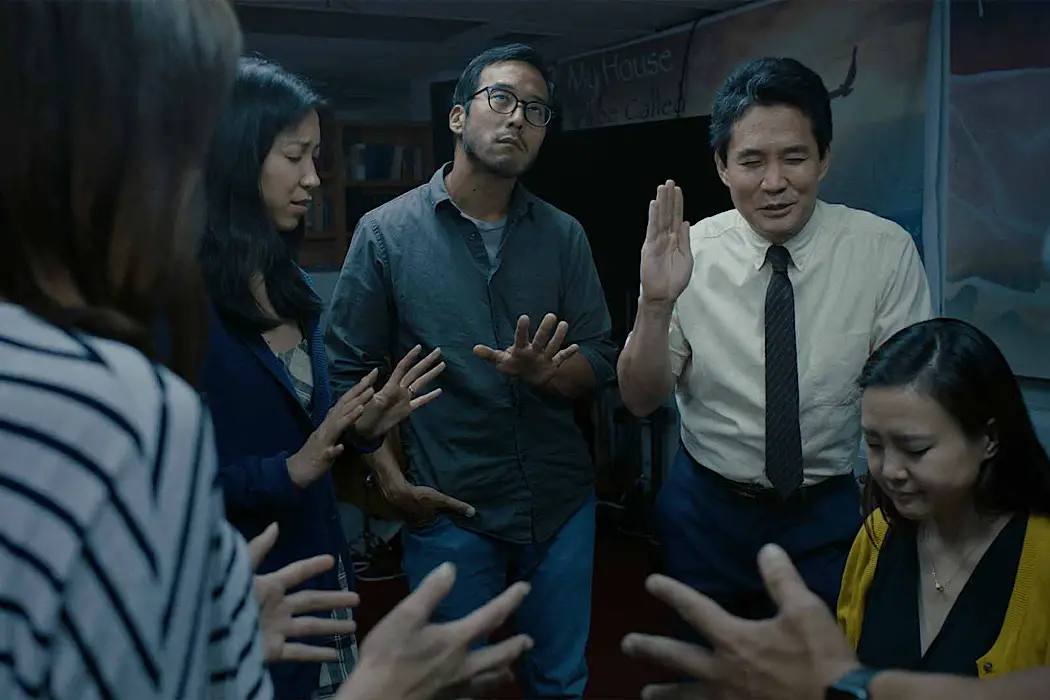
Film critic, Ithaca College graduate, University of St Andrews masters…
NewFilmmakers Los Angeles brings its NFMLA Monthly Film Festival online June 5 to 7, debuting twin InFocus lineups spotlighting Female Cinema and Asian Cinema. The Asian Cinema program comprises two blocks of shorts and one feature film, most of which are in English. The festival, enabled by Seed&Spark’s virtual film fest platform, features a trademark emphasis on emerging filmmakers and storytellers, and with part 1 of its Asian Cinema series, we can see these voices tackling narratives that are at times heartbreaking, mysterious, comedic, uncomfortable, and messy.
Jackets For Butterflies (Hank)
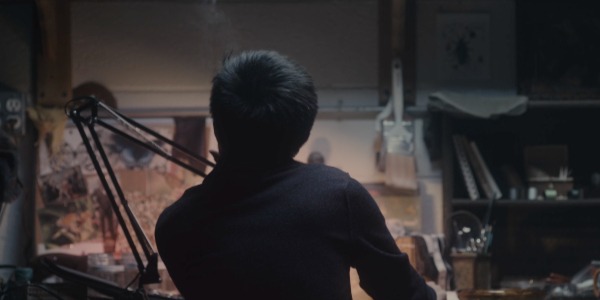
The first shorts block, titled Power and Meaning, get weird right out of the gate with Jackets For Butterflies. The film opens innocuously enough, almost like a Pixar short — an absence of dialogue, cinematographer Colin Earner’s lovely symmetrical framing, and meticulous attention to detail from production designer Sophie Swenholt and lead actor Zhan Wang. Tools and craft supplies litter the shadowy studio, and several habitats hang in the corner, filled with gorgeous monarch butterflies. As the artist at the film’s core, Wang spends much of the film hunched over a workbench, surrounded by fabric, scissors, and empty coffee cups. The experience sours when we realize what he’s doing and that the title, Jackets For Butterflies, is actually literal.
The short, from director Hank, metamorphoses into a butterfly snuff film before our eyes. For all the work the artist has put into his butterfly clothing — he’s even got little holes cut out for their limbs — the butterflies don’t want to wear it. Things turn sadistic, and his art installation inadvertently becomes a taxidermy display. He was definitely the kind of kid who held magnifying glasses up to ants.
The psychological horror is helped along by a playfully synthetic, twangy score from James Gibian, intense slow-burn editing from Nick Brown, and yes, very tasteful butterfly costumes fashioned by Lindsay Austria. But Jackets For Butterflies never justifies its cruelty. Perhaps the story was reaching for allegory or an investigation of the destruction wrought to realize an artist’s vision.
But if that was the intention, the film undergoes another tonal shift before the credits, leaving us with a bizarre (albeit beautiful) acoustic ballad and a montage of the artist burning the jackets and admiring his butterflies’ tiny, sad graves. The film’s dramatic low-angle closeups and musty, garagelike environs convinced me the artist was the villain, so the too-late volta into sympathy only underlines the senselessness of the film’s tragedy. The artist gets to have his successful art installation and a change of heart at the end — too bad for the butterflies.
Fans of psychological drama, however, should be pleased with Jackets For Butterflies’ dark, uncomfortable trip into small-scale horror — really small-scale — replete with micro victories, microtraumas, and micro groves.
The Cat in Me (Xuerui Wang)
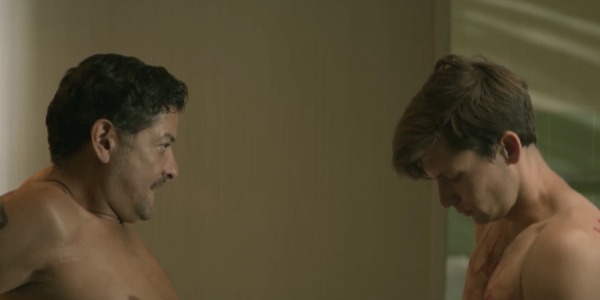
Any filmmaker who wants to work with butterflies or cats deserves respect. The cat doesn’t do much in The Cat in Me besides lounge about and stare at our protagonist, Meno (Kyle Mac), but the animal is central to the film’s themes. The short, from director Xuerui Wang and writer Lingyu Wang, explores predatory relationships — Meno is a fish who wants to be a cat, and a salacious, abusive producer (Carlos de Alba) treats him like prey.
The first four minutes of The Cat in Me are pretty perfectly paced for a short film, coming out sprinting and constantly challenging the viewer’s expectations and presenting new information. The producer is drawing scales on Meno’s torso with lipstick, there are minnows in the bathroom sink and a cat on the bed, and before we know it, we’re spirited away to a film set in the midst of a shoot. Meno’s an actor and is neither very good nor very reliable.
Portions of The Cat in Me suggest an interest in mental illness, given Meno’s erratic behavior and rage-induced outbursts on set. We see he’s fighting an uphill battle for decent work — he lives out of his car with his cat, and the producer uses him for sex and treats him like trash — but the film is also too abstract and generalist to offer anything more definitive about Meno’s character. We even close with one of those obvious songs that restate the film’s themes in case we didn’t get it the first time, but we learn precious little else about Meno.
Through it all, Xuerui employs his bizarre movie set scenes and some odd asides like Meno’s encounter with a frenzied homeless woman (Elizabeth Camboy-Wilson), keeping us entertained like shaking a feather wand in front of a cat. And when confined to a small set — like the hotel room confrontations that bookend the film — Xuerui shows a real talent for staging. He and cinematographer Khoi Nguyen use sparse lighting evocatively in the opening. And the climax, which finds Meno fighting the producer and vaulting catlike across the room, captures the delirium with a bold magenta light and great handheld work. It has a jumble of themes and some over-the-top performances, but The Cat in Me’s engaging plot and frenetic pacing ultimately win you over.
A Sunburnt Summer (Zicheng Li)
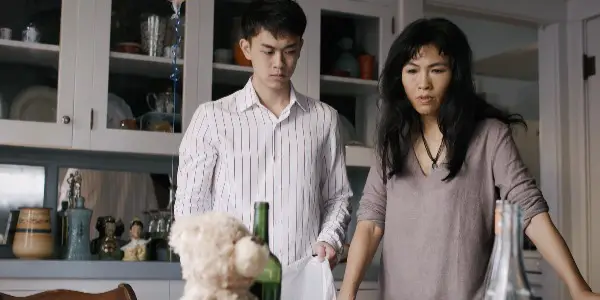
Teddy (Nic Tom) wakes up sick with bruises on his wrists. His mother (Grace Chang) doesn’t know how they got there, and Teddy doesn’t want to tell her. That’s how A Sunburnt Summer, a haunting drama about the aftermath of sexual assault, begins.
Short films don’t often feel like short stories, but something about A Sunburnt Summer’s moth-eaten sorrow, buried trauma, and ambiguous resolutions feels like reading ink on a page, like a morose, multilayered piece William Faulkner would write. Its characters and their tragedies imply a world beyond the confines of the 20-minute runtime that we never get to experience but know is there. Even details like when the characters speak English and when they switch to Chinese illustrate the immense care writer-director Zicheng Li brings to the story.
As much as A Sunburnt Summer drills into Teddy’s victimhood and the crime committed against him, the film’s not graphic. It suggests as much malice with a cutaway to a half-closed bedroom door as it does at the end of the film, with a locked-down, equivocal camera angle facing an empty, sunlit home. A Sunburnt Summer feels like a ghost story with all the specters looming just outside of the frame.
The short film thrives in moments like Teddy’s confrontation with his friend Lily (Kathy Khanh Nguyen), who’s possibly the only person who can testify for him. She backs away, regretfully says that she can’t help him because she wasn’t there to see the assault happen, and she leaves, but we stay in that shaky side profile of her the entire time. We know that she wants to help, but she keeps trying to twist her way out of the conversation.
The film is never expressionistic. Cinematographer Huazhang Dai shoots most of the scenes handheld, up close, with naturalistic lighting. Special attention is paid to how window frames cast shadows over characters’ faces like prison bars. And A Sunburnt Summer avoids histrionics, too, preferring to show its drama in hushed conversations and unspoken rage. A court case is threatened, but we never see any lawyers, nor do we learn whether or not a trial actually transpires. It’s a more thoughtful treatment of sexual assault than it would otherwise be, a smart character study from an exciting new artist.
Master of Divinity (Eugene Suen)
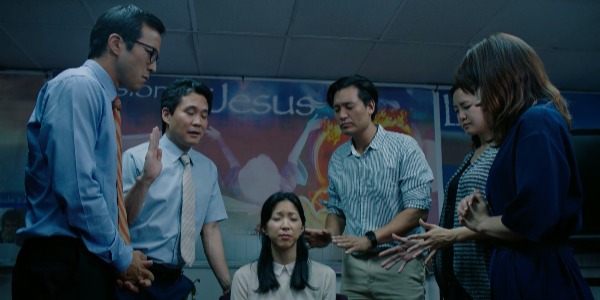
Between a relationship drama and a satire of organized religion is Master of Divinity, a short from writer-director Eugene Suen. We meet its protagonist, Josh (Jun Kim), in church with his wife, Irene (Jennifer Soo). It’s a small church that feels more akin to an elementary school auditorium, with a giddy pastor (Johnny Kwon) who behaves like a Blues Clues host. It’s the kind of place that has an acoustic guitar sitting on the stage, and you’re wondering why it’s there but also praying you never find out.
Irene wants a change — she’s planning to quit her job, and thanks to a revelation from the Holy Spirit, she thinks now’s the right time. But Josh is knee-deep in procrastination on a new screenplay, and he doesn’t want to retreat to his adjunct position at the seminary. Suen’s script deftly navigates Irene and Josh’s fraught marriage, as well as Josh’s muddled relationship with God and Christianity. He’s terribly bored at church and openly resents Pastor Lee, but he also loves researching religion. He wants to write a film about a Korean immigrant to the U.S. experiencing a crisis of faith.
Filmmaker characters in movies are usually straight piffle, obvious director or writer stand-ins, and vessels for either joke about “the industry” or airy gesturing about the meaning and the hero’s journey. In Master of Divinity, all Josh can do is gesture airily about the meaning and the hero’s journey, but that’s the joke. And Suen and editor Daniel Raim construct two fact-paced, keen, and quippy screenplay-structuring scenes around it. We see Josh ramble about a script he hasn’t written but wants to model after both Winter Light and Diary of a Country Priest while still somehow keeping it commercial.
The oddball tone works for Master of Divinity, though I found the film to be more clever than it is funny. But Suen and his actors maintain a focus on character and faith above all else, and Master of Divinity, though never as funny as it wants to be, achieves a higher calling than most comedies aspire to; Character arcs are fulfilled, organized religion doesn’t take as much of a beating as it might otherwise have, and the goofball hero realizes he probably needs to grow up.
Learn more about the NFMLA Monthly Film Festival, and buy tickets and festival passes here.
Does content like this matter to you?
Become a Member and support film journalism. Unlock access to all of Film Inquiry`s great articles. Join a community of like-minded readers who are passionate about cinema - get access to our private members Network, give back to independent filmmakers, and more.
Film critic, Ithaca College graduate, University of St Andrews masters student, head of the "Paddington 2" fan club.












